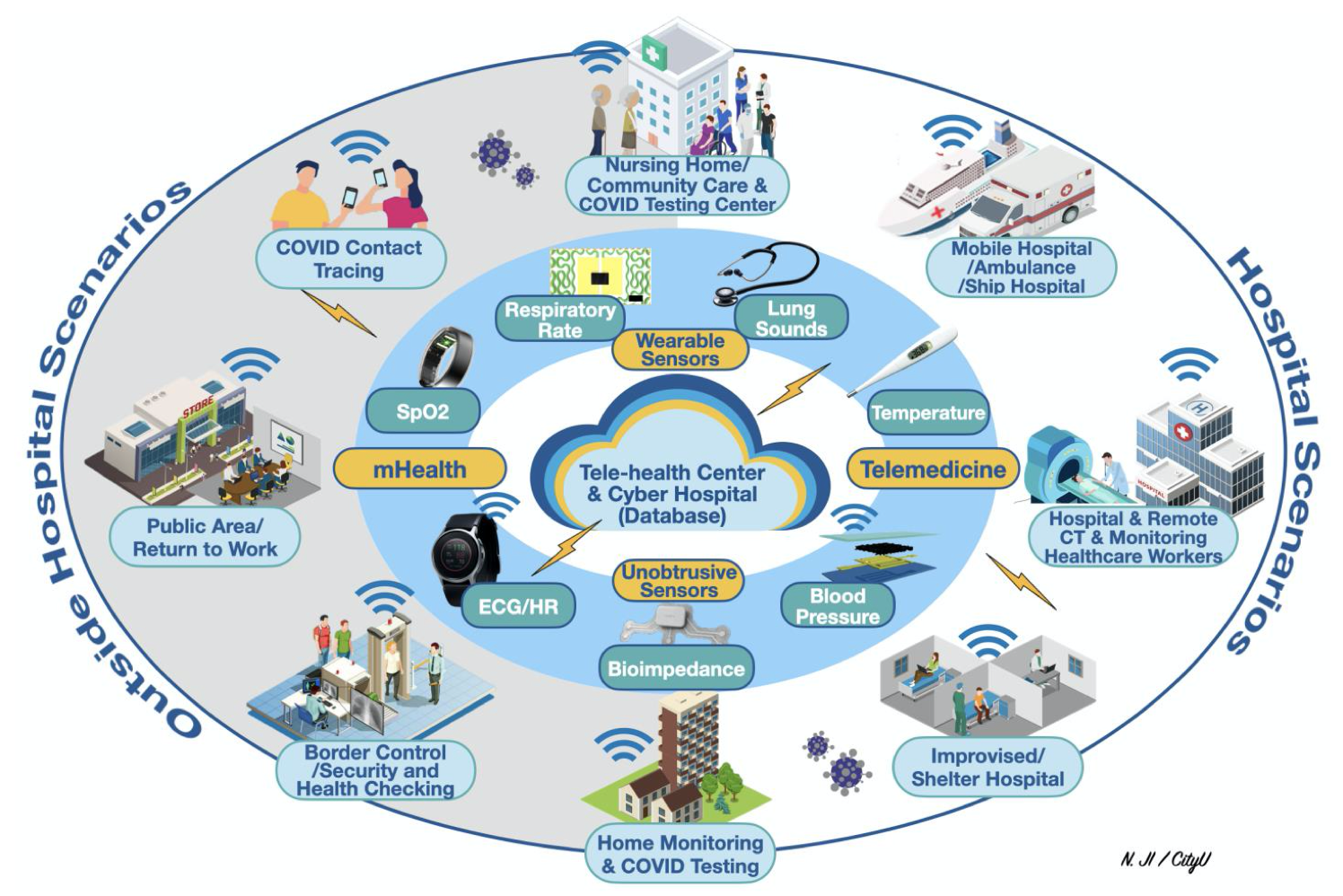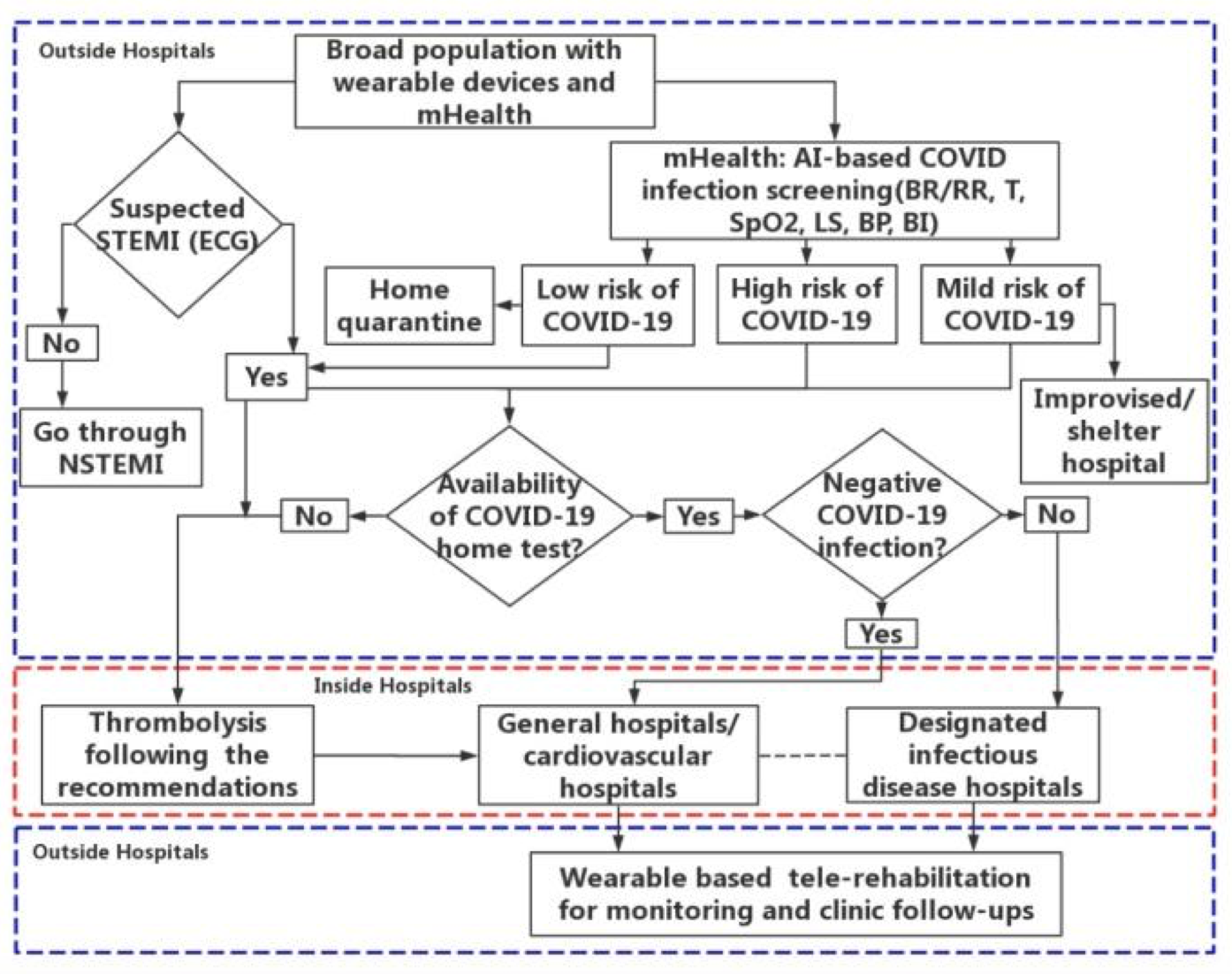CityU joining international study on roles of wearable and mHealth technologies in Covid-19 pandemic
The Covid-19 pandemic has put enormous pressure on the healthcare system globally. Until a vaccine is developed, it remains challenging for the healthcare sector to fight against the pandemic by providing enough isolation beds and quarantine facilities, as well as conducting contact tracing, while maintaining normal medical care service. An International Task Force including the cerebro-cardiovascular health engineering expert from City University of Hong Kong (CityU) was led by the team of Harvard Medical School at Spaulding Rehabilitation Hospital, Boston, USA and published jointly a study on the roles of mobile health (mHealth) technologies amid the Covid-19 pandemic. It is concluded that wearable-based mHealth technologies could be used to monitor Covid-19 patients and predict symptom escalation for earlier intervention.
The study entitled “Can mHealth Technology Help Mitigate the Effects of the Covid-19 Pandemic?” is published in the newest issue of IEEE Open Journal of Engineering in Medicine and Biology in August 2020.
The aim of the study was to review mHealth and wearable technologies and explore their use to monitor and mitigate the effects of the Covid-19 pandemic. The Task Force identified technologies that could be deployed in response to the Covid-19 pandemic and would likely be suitable for future pandemics. They found that wearable-based mHealth technologies are viable options to monitor Covid-19 patients and be used to predict symptom escalation for earlier intervention.
Professor Zhang Yuanting, Chair Professor in Biomedical Engineering at CityU, was one of the 60-member experts of the Task Force established as part of the Mass General Brigham (MGB) Center for COVID Innovation. The Task Force also consisted of experts from Wyss Institute at Harvard University, MIT Lincoln Laboratory, Massachusetts General Hospital, Brigham and Women’s Hospital, RWTH Aachen University in Germany, University of New South Wales (UNSW) in Australia, University Hospitals National University of Ireland Galway, ETH Zurich, Politecnico di Torino in Italy, University College Dublin in Ireland and others.
Experts working together towards a common goal
Dr Paolo Bonato, Director of the Spaulding Motion Analysis Lab, was the lead author on the study. “To be able to activate a diverse group of experts with such a singular focus speaks to the commitment the entire research and science community has in addressing this pandemic. Our goal is to quickly get important findings into the hands of the clinical community so we continue to build effective interventions,” said Dr Bonato.

(Photo source:DOI number:10.1109/OJEMB.2020.3015141)
Telehealth usage and mobile health technologies, commonly called mHealth, has gained the attention of the public at large. While telehealth has allowed patients to stay connected for ongoing appointments and check-ins, wearable mHealth technologies provide a significant opportunity for data collection and mHealth technology could be used to monitor patients with mild symptoms who have tested positive for Covid-19.
Wearable mHealth technologies help collect data for monitoring patients
These patients are typically instructed to self-quarantine at home or undergo monitoring at community treatment centres. However, a portion of them eventually experience an exacerbation, namely the sudden occurrence of severe symptoms, and require hospitalization. In this context, mHealth technology could enable early detection of such exacerbations, allowing clinicians to deliver necessary interventions in a timely manner thus improving clinical outcomes.
The Task Force paper concluded that smartphone applications enabling self-reports and wearable sensors enabling physiological data collection could be used to monitor clinical personnel and detect early signs of an outbreak in the hospital/healthcare settings.
They also reported similarly, in the community, early detection of Covid-19 cases could be achieved by building upon prior studies which showed that by using wearable sensors to capture resting heart rate and sleep duration, it is possible to predict influenza-like illness rates as well as Covid-19 epidemic trends.
They also pointed out that when combined with diagnostic and immune status testing, mHealth technology could be a valuable tool to help mitigate, if not prevent, the spread of Covid-19 virus. Specifically, such technology could estimate the probability of infection and prioritize diagnostic testing in individuals whose data suggest a moderate to high probability of infection.
“The better data and tracking we can collect using mHealth technologies can help public health experts understand the scope and spread of this virus and most importantly hopefully help more people get the care they need earlier. Our hope is to build on more studies from here and continue to expand our understanding,” said Dr Bonato.
Integrating health information technology by AI
Moreover, CityU’s health engineering research team which was led by Professor Zhang, in collaboration with experts from University of Oxford in UK, Harvard Medical School in USA, UNSW in Australia, Fudan University in China, Philips HealthCare in Netherlands and others, has published another article entitled “Wearable Sensing and Telehealth Technology with Potential Applications in the Coronavirus Pandemic” in IEEE Reviews in Biomedical Engineering, which was ranked as the second among the top 50 popular papers selected monthly by the Journal in both June and July.


The objective of this article is to examine enabling technologies and systems from wearable sensing, mHealth, contact tracing, remote diagnosis/telemedicine to portable medical imaging with various application scenarios for handling the Covid-19 crisis. It presents specifically the recommendation to use wearable devices and mHealth systems in closed-loop management of patients with acute myocardial infarction - a most life-threatening cardiovascular disease (CVD) during the Covid-19 pandemic.
The proposed closed-loop strategy refers to monitoring patients with acute myocardial infarction from home to hospital and post-hospitalization periods by using wearable devices and mHealth technologies. It can also help conduct triage and diagnosis remotely, or even telemedicine and follow-ups for patients with suspected heart attacks or Covid-19 symptoms.
Professor Zhang Yuanting, coordinator of the health engineering team at CityU, who participated in the MGB Task Force and is a co-author of both articles, said “to control effectively both COVID and CVD, it is critically important and urgently needed to develop a precise and rapid response system integrating wearables, mHealth, biosensing/molecular detection, medical imaging and AI that enables early detection, early predication, early prevention, early diagnosis and early intervention of the diseases.”